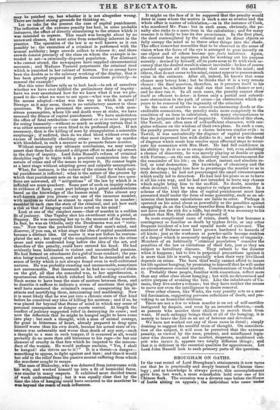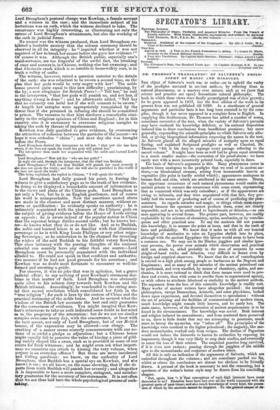BROUGHAM ON OATHS.
IN the vast round of Lord Brougham's attainments it now turns out that he is practically and deeply learned in Chinese theo- logy ; and as knowledge is always power, this accomplishment gave him, last week, a most remarkable hold over one of his Chinese flock. The occasion was a divorce case before the House of Lords sitting on appeals ; the individual who came- under Lord Brougham's pastoral charge was Kowhan, a female servant and a witness in the case ; and the immediate subject of his hertations was an oath, which the witness declined to take. The occurrence was highly interesting, as illustrating not only the extent of Lord Brougham's attainments, but also the working of the oath in judicial forms.
No sooner was the witness produced, than Lord Brougham ex- hibited a laudable anxiety that the solemn ceremony should be observed in all its integrity : he " inquired whether it was not required of her to break her saucer before she gave her evidence ?" Of course it was. Although the British public, especially one's maid-servants, are too forgetful of the awful fact, the breaking of cups and saucers is, in Chinese, nothing else but swearing; and that wholesale crash which is so terrible to housewifely ears, is in truth a volley of oaths. The witness, however, raised a question anterior to the details of the oath: she was reluctant to be sworn a second time, on the plea that her gods would be very angry with her! The noble bonze proved quite equal to this new difficulty ; proclaiming, by
the by, a new allegiance for British Peers Tell her," he said to the interpreter, "that her gods will punish us, and not her, if anything wrong is done " : and he afterwards added, "Tell her that no calamity can befal her if she will consent to be sworn." At length her scruples were appropriately vanquished by the threat that if she persisted in refusing she should be committed to prison. The recourse to that hint discloses a remarkable simi- larity in the religious opinions of China and England ; for in this country also it is customary to overcome religious scruples to taking the oath by threats of imprisonment.
Kowhan was duly qualified to give evidence, by overcoming the attraction of cohesion between the particles Of the:saucer—we hope it was orthodox " china "; and next day she was brought before the Peers.
Lord Brougham desired the interpreter to tell her, " that now she has been sworn, if she does not speak the truth her gods will punish her." The interpreter then made her acquainted with the noble and learned Lord's remark.
Lord Brougham—" Now ask her who are her gods?'"
In reply she said, through the interpreter, that the chief was Buddah.
Lord Brougham—" Tell her that Buddah will punish her most severely if aim does not speak the truth; and that she will also be punished in this world if she does not speak the truth." This being explained, she replied in Chinese, " I will speak the truth."
Lord Brougham had fully gained his point, in forcing the witness to give a satisfactory gage as to the truth of her evidence. In doing so he displayed a remarkable amount of information as to the views and plans of the Chinese gods. Lord Brougham is not only a Peer, but he is an English gentleman, and of course his word is unimpeachable. Now the assertions quoted above are made in the clearest and most distinct manner, without re- serve or qualification : he evidently speaks on authority: he is intimately acquainted with the pleasure of the Chinese gods on the subject of giving evidence before the House of Lords sitting on appeals ; he is aware indeed of the popular notion in China that the supernal beings dislike second oaths ; but he knows bet- ter—he knows what they do or do not like. And as to Buddah, the noble and learned bonze is as familiar with that illustrious personage as he is with King Louis Philippe or any other reign- ing Sovereign ; so he undertakes to be the channel for revealing the wishes of the said Buddah to his faithful votary Kowhan. This close intimacy with the passing thoughts of the eminent celestial can scarcely have any other than one source—Lord Brougham must be personally acquainted with the individual alluded to. He could not speak in that confident and authorita- tive manner if he had not good grounds for his assertion ; and Rowhan was no doubt most fortunate to encounter so well-in- formed and unerring a guide.
For observe, it was no joke that was in agitation, but a grave judicial affair; to say nothing of poor Kowhan's erroneous doc- trine in that matter of faith. Lord Brougham was obviously
Buite alive to his solemn duty towards both Kowhan and the ritish tribunal. Accordingly, he vouchsafed to the erring mor- tal that sacred revelation which consolidated her faith in the "true religion "; for such is hers by the custom of China and the practical testimony of the noble bonze. And he secured what the wisdom of the British law accounts the best and only guarantee for the correctness of evidence. You might imagine that Kow- ban's reluctance to take an oath indicated some doubt in her mind as to the propriety of the attestation : but do we not see similar scruples overcome every day, with the concurrence, at least with the tacit assent, not only of Lord Brougham, but of our British bonzes, if the expression may be allowed—our clergy. The cracking of a saucer seems scarcely commensurate with our no- tions of so awful a pledge as adjuration; but a Chinese bonze might equally fail to perceive the value of kissing a piece of gild- mg rudely shaped like a cross, such as is provided in some of our -courts for Irish witnesses ; and he might even ask what import- ance we ourselves can attach to kissing the very volume, when perjury is an everyday offence ? But those are mere incidental and trifling questions: we know, on the authority of Lord Brougham, that Buddah has a special eye on Kowhan, and she ,knows it too ; we all know, on the same showing, that if she de arts from truth Buddah will punish her severely ; and altogether s$ is impossible to have a more complete, stringent, and satisfac- ilmy guarantee for the accuracy of herstatements. It is not often Mot we see thus laid barb the whole psychological process of oath- 44148%



























 Previous page
Previous page